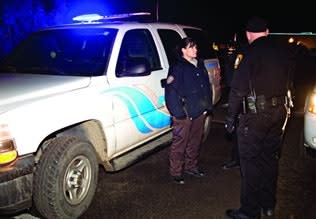The crisp nights of autumn have given way to cooler days, and winter will soon reveal itself. For readers in the warmer environs, winter could just mean a lower SPF-level sunscreen. For some of us, it means coats, gloves, patrol sweaters, knit caps, and different tactics.
You must also consider the fewer hours of daylight. Yes, young recruits, your tactics need a seasonal tune-up. I've said it takes you a good year to see the entire side of patrol life, so pay attention, young warriors.
The very thought of wearing gloves should send you to the range for practice. I know many of the tactical operators wear gloves and train with them. Most officers wear protective gloves to prevent cuts and pricks from concealed sharps carried by drug users. So the idea of wearing gloves should not be remote. Cold weather gloves are thicker, which causes a loss of dexterity for most of us.
We should practice on the range with gloves, but why stop there? Defensive tactics instructors and Field Training Officers (FTOs) should require that recruits do the following. Practice with long sleeves, winter coat, and gloves. Try removing, deploying, and securing all the equipment on your belt. Because we have fewer hours of daylight, practice this in low-light conditions. Practice defensive tactics in the attire you work in.
Speaking of your equipment belt, do you carry anything extra during the winter months? I know several great tacticians that recommend a back-up flashlight. Longer hours of darkness put more drain on your regular flashlight. (Hint: Carry a spare bulb). I carry a small disposable LED squeeze flashlight clipped with my ID and building-entry card that's around my neck.
I've seen many officers that don't wear a jacket on a traffic stop; they claim it inhibits their response should they have to spring into action. Let's talk common sense here. You can wear some of the high-tech insulated underwear. but what happens if the stop becomes prolonged? Standing there and shivering out of control doesn't send a tactically sound message.
The same could be said for making contact without gloves. You don't want to lose your nimbleness during the interaction. If this goes longer than anticipated and your fingers become numb, you've made the choice. Rethink your options. Don't forget about using your portable radio buttons and knobs with gloves on. This will be an eye-opener.
One thing that totally bugs me is that there are some departments that still require officers to wear dress low quarters for appearance sake during winter. Wake up administrators! When was the last time you dragged your butt out in the cold from the warm confines of headquarters? Good quality boots with insulation will make the worse winter night more pleasant and provide better footing in the slush.
Your choices and preparation give you tactical advantages. Just visualizing your performance in winter apparel at summertime speed will not cut it. Get some practice time in. If nothing else, go to a safe environment. Clear all weapons and devices and review the deployment of the goodies on your belt. A little practice time may save your life.












